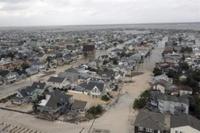-
CIA-commissioned climate change report outlines perils for U.S. national security
U.S. national security leaders believe that the accelerating pace of climate change will place severe strains on U.S. military and intelligence agencies in coming years; the reason, according the National Research Council, the U.S. top scientific research body: climate changes will trigger increasingly disruptive developments around the world; a 206-page National Research Council study, commissioned by the CIA and other U.S. intelligence services, concludes that states will fail, large populations subjected to famine, flood, or disease will migrate across international borders, and national and international agencies will not have the capacity or resources to cope with the resulting conflicts and crises
-
-
Michigan launches Cyber Range – a cutting-edge cybersecurity training program
Michigan has launched the Michigan Cyber Range, a state-of-the-art facility that prepares cybersecurity professionals in the detection and prevention of cyber attacks; the initiative pairs cybersecurity resources with hands-on training opportunities to enhance Michigan’s protection of computer systems and sensitive data
-
-
Supreme Court to hear police DNA-collection case
The United States Supreme Court last week granted certiorari in Maryland v. King; in the case, Maryland law enforcement stands to lose the right to require a DNA collection as part of booking procedures for certain felony crimes; a similar law was passed by Congress in 2004 for federal arrests, and twenty-four other state legislatures have also passed such laws
-
-
Cleanup of most contaminated U.S. groundwater sites unlikely for many decades

At least 126,000 sites across the United States have contaminated groundwater that requires remediation, and about 10 percent of these sites are considered “complex,” meaning restoration is unlikely to be achieved in the next 50 to 100 years due to technological limitations; the estimated cost of complete cleanup at these sites ranges from $110 billion to $127 billion, but the figures for both the number of sites and costs are likely underestimates
-
-
DREAM Act could generate billions for U.S. economy
A new study estimates that passing the DREAM Act would contribute $329 billion to the U.S. economy by 2030, or $18 billion a year; under the act, illegal immigrants would be able to go to school, work legally, obtain professional licenses, and enjoy other benefits, which will see them earn more, pay more in taxes, and consume more goods and services
-
-
Administrations temporarily waives some immigration measures in wake of Hurricane Sandy
The Obama administration has waived immigration laws for illegal immigrants now in the United States, saying that the immigrants’ ability to maintain their lawful status or collect benefits has been effected by Hurricane Sandy; this measure will provide relief for immigrants, but some people are not happy with it
-
-
Long-term sea level rise could cost Washington, D.C. billions
New study projects that the city of Washington, D.C., and federal property in the city, could suffer billions of dollars in damage if sea level rise as a result of global warming increases over the next century. Potential for significant damage will be even greater in the event of extreme weather like Hurricane Sandy
-
-
NY, NJ brace for nor’easter
East Coast resident are still coping with the destruction wreaked by Hurricane Sandy, but now they have to prepare for another potentially destructive storm – a nor’easter which is expected to hit New York and new Jersey on Wednesday; the nor’easter will likely stay 50-100 miles off shore, but its western edges will bring winds of up to 55 mph, coastal flooding, up to two inches of rain along the shore, and several inches of snow to Pennsylvania and New York
-
-
Housing problems loom large in post-Sandy New York City

As a result of Hurricane Sandy, New York City is now dealing with more than 40,000 people who do not have homes to go back to; Mayor Michael Bloomberg said that the number is the worst possible case given by the Department of Housing and Urban Development (HUD), and 20,000 is a more realistic assessment of how many people are homeless; as of late Sunday, 182,000 residents of New York, New Jersey, and Connecticut have applied for disaster assistance, and $158 million has been approved
-
-
Many NYC buildings to remain closed for weeks, months for clean-up, repairs
Water and winds produced by Hurricane Sandy destroyed mechanical and electrical systems in many commercial and residential buildings in Lower Manhattan; as a result, many buildings in the area are weeks or months away from being repaired and fully operational
-
-
Obama, Romney differ on major homeland security issues

Tomorrow, Tuesday 6 November, American voters will choose between Barack Obama and Mitt Romney as the next president of the United States; the state of the U.S. economy and the best ways to reduce unemployment and increase the pace of economic growth were at the center of the campaign, leaving little room for other issues. Homeland security issues, in particular, played little, if any, role in the campaign or in the three debates between the presidential candidates and the debate between the vice-presidential candidates; still, if we examine the policy proposals each candidate has made, and also examine the details of policies posted on his Web sites, the differences between the candidates’ approaches on three major homeland security issues – immigration, cybersecurity, and infrastructure – are considerable
-
-
States, localities to assume more responsibilities for rebuilding U.S. aging infrastructure
Infrastructure in the United States is in bad shape; Maryland needs more than $100 million a year for its bridges; Virginia needs $125 million per year for roads that need repaving; Washington’s failure to create a long-term funding plan to repair the nation’s infrastructure is forcing state and local governments to fill the void in federal funding
-
-
Sandy in perspective
Hurricane Sandy has left death and destruction in its path, and it broke a few records, but there were worse hurricanes; since 1900, 242 hurricanes have hit the United States; if Sandy causes $20 billion in damage, in 2012 dollars, it would rank as the seventeenth most damaging hurricane or tropical storm out of these 242; the Great Miami Hurricane of 1926 tops the list; Hurricane Katrina ranks fourth; from August 1954 through August 1955, the East Coast saw three different storms make landfall — Carol, Hazel, and Diane; each, in 2012, would have caused about twice as much damage as Sandy
-
-
Algeria agreed to join military campaign to oust Mali Islamic militants
Secretary of State Hillary Rodham Clinton on Monday met with Algeria’s president Abdelaziz Bouteflika, seeking Algeria’s support for an emerging international effort to evict Islamic militants out of northern Mali; Algeria has the region’s strongest military, a highly regarded intelligence service, a long border with Mali, and experience in fighting, and defeating, Islamic militants; the UN Security Council declared its “readiness” to send an international force to evict the militants
-
-
U.K. govt. awards £37.1 million for civilian nuclear research
The U.K. Department for Business, Innovation and Skills has announced an award of 37.1 million pounds to the University of Sheffield’s Nuclear Advanced Manufacturing Research Center (Nuclear AMRC), which are working in partnership with Rolls-Royce as the lead company for the U.K. nuclear supply chain
-
More headlines
The long view
Factories First: Winning the Drone War Before It Starts
Wars are won by factories before they are won on the battlefield,Martin C. Feldmann writes, noting that the United States lacks the manufacturing depth for the coming drone age. Rectifying this situation “will take far more than procurement tweaks,” Feldmann writes. “It demands a national-level, wartime-scale industrial mobilization.”
No Nation Is an Island: The Dangers of Modern U.S. Isolationism
The resurgence of isolationist sentiment in American politics is understandable but misguided. While the desire to refocus on domestic renewal is justified, retreating from the world will not bring the security, prosperity, or sovereignty that its proponents promise. On the contrary, it invites instability, diminishes U.S. influence, and erodes the democratic order the U.S. helped forge.
Fragmented by Design: USAID’s Dismantling and the Future of American Foreign Aid
The Trump administration launched an aggressive restructuring of U.S. foreign aid, effectively dismantling the United States Agency for International Development (USAID). The humanitarian and geopolitical fallout of the demise of USAID includes shuttered clinics, destroyed food aid, and China’s growing influence in the global south. This new era of American soft power will determine how, and whether, the U.S. continues to lead in global development.
Water Wars: A Historic Agreement Between Mexico and US Is Ramping Up Border Tension
As climate change drives rising temperatures and changes in rainfall, Mexico and the US are in the middle of a conflict over water, putting an additional strain on their relationship. Partly due to constant droughts, Mexico has struggled to maintain its water deliveries for much of the last 25 years, deliveries to which it is obligated by a 1944 water-sharing agreement between the two countries.
How Disastrous Was the Trump-Putin Meeting?
In Alaska, Trump got played by Putin. Therefore, Steven Pifer writes, the European leaders and Zelensky have to “diplomatically offer suggestions to walk Trump back from a position that he does not appear to understand would be bad for Ukraine, bad for Europe, and bad for American interests. And they have to do so without setting off an explosion that could disrupt U.S.-Ukrainian and U.S.-European relations—all to the delight of Putin and the Kremlin.”
How Male Grievance Fuels Radicalization and Extremist Violence
Social extremism is evolving in reach and form. While traditional racial supremacy ideologies remain, contemporary movements are now often fueled by something more personal and emotionally resonant: male grievance.
